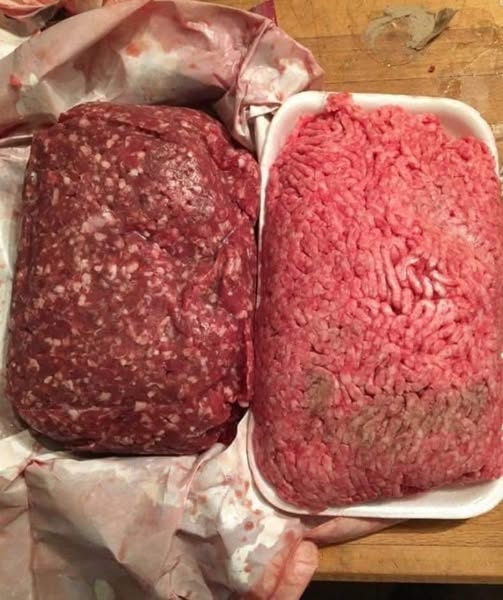When buying beef, the decision involves much more than simply picking a cut of meat off the shelf. It affects not just the flavor and quality of the beef you consume but also broader considerations such as health, ethics, and environmental impact. Understanding the distinctions between store-bought and farm-raised beef can empower you to make more informed choices that align with your values and priorities.

Store-bought beef is the most widely available option for many consumers. Its appeal often lies in its convenience and affordability, but a closer look reveals some important details about its production and characteristics. One of the most noticeable traits of store-bought beef is its lighter, pinkish color. While this appearance might seem fresh and appealing, it is not an inherent quality of the meat. Instead, this coloration is typically the result of preservatives and additives, such as propyl gallate, which are used to extend the meat’s shelf life and enhance its visual appeal. These substances, while effective at keeping the meat looking fresh, introduce artificial elements into the food you consume.
Beyond additives, store-bought beef is often sourced from large-scale industrial farms where cattle are raised in high-density environments. These farms prioritize efficiency and profit, sometimes at the expense of animal welfare and environmental sustainability. In many cases, the cattle are fed grain-based diets supplemented with growth hormones and antibiotics to maximize weight gain and prevent illness in crowded conditions. While these practices allow for lower costs and higher production, they can have negative implications for both the quality of the meat and the health of the consumer. Antibiotic use, for instance, raises concerns about the development of antibiotic-resistant bacteria, which can pose a significant public health risk.
In contrast, farm-raised beef offers a completely different approach to production. Typically sourced from smaller, family-run farms, this type of beef prioritizes natural farming methods and ethical treatment of animals. Cattle raised on farms often have access to open pastures where they can graze freely on grass, their natural diet. This grass-fed approach not only improves the quality of life for the animals but also results in beef that is richer in flavor and nutrients.
Grass-fed, farm-raised beef is known for its superior nutritional profile compared to grain-fed, store-bought beef. It contains higher levels of beneficial omega-3 fatty acids, which are essential for heart and brain health, and is lower in unhealthy saturated fats. Additionally, farm-raised beef is often free from the antibiotics and growth hormones commonly found in store-bought meat, making it a cleaner and more natural choice for health-conscious consumers.
Another notable distinction is the environmental impact of these two types of beef. Large-scale industrial farming, which produces much of the beef found in stores, contributes significantly to greenhouse gas emissions, deforestation, and water pollution. The high volume of grain required to feed cattle on industrial farms often leads to unsustainable agricultural practices. On the other hand, farm-raised beef from smaller, pasture-based farms tends to have a lower environmental footprint. By allowing cattle to graze on grass, these farms avoid the need for large-scale grain production and contribute to healthier soil and ecosystems.
The ethical considerations of buying farm-raised beef are also worth noting. Many consumers feel more comfortable supporting small, local farms where animals are treated humanely and allowed to live in natural conditions. Knowing that the beef you’re purchasing comes from a farm that values animal welfare can add an extra layer of satisfaction to your meal, making the experience more meaningful.
While farm-raised beef has clear advantages in terms of quality, health, and ethics, it’s important to acknowledge that it is often more expensive than store-bought beef. The cost reflects the time, labor, and resources required to raise cattle in a sustainable and humane way. However, for many people, the benefits of choosing farm-raised beef outweigh the higher price tag. Supporting local farmers and investing in high-quality meat can be seen as a long-term commitment to health, environmental sustainability, and ethical food production.
In making your decision, consider what matters most to you. If convenience and cost are top priorities, store-bought beef might be the better choice. But if you value higher quality, better nutrition, and ethical practices, farm-raised beef offers a compelling alternative. By understanding the key differences between the two, you can make choices that align with your personal values and contribute to a more sustainable and mindful food system.





